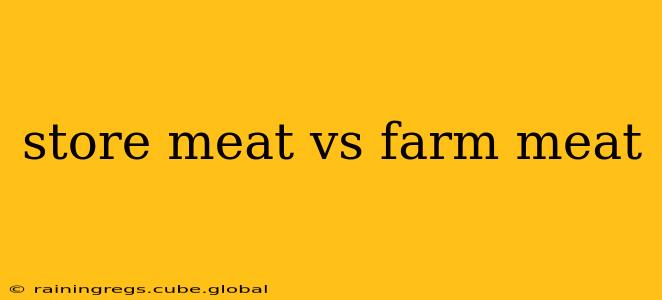Choosing between store-bought and farm-raised meat is a decision many consumers grapple with. This comprehensive guide delves into the key differences, helping you make an informed choice based on your priorities – taste, health, environmental impact, and ethical considerations.
What are the Key Differences Between Store-Bought and Farm-Raised Meat?
The most significant differences lie in the animal's raising environment, feed, and processing methods. Store-bought meat typically comes from large-scale industrial farms, characterized by high-density animal populations and standardized feeding practices. Farm-raised meat, on the other hand, often originates from smaller farms emphasizing humane treatment, pasture-raising, and natural feed sources. Let's break down these aspects in more detail.
Raising Environment:
- Store-Bought Meat: Animals are often confined to crowded, indoor facilities, limiting their movement and access to natural sunlight. This can increase the risk of disease outbreaks and the need for antibiotics.
- Farm-Raised Meat: Animals typically have access to pastures and open spaces, allowing for natural foraging and behavior. This often leads to healthier, less stressed animals.
Feed:
- Store-Bought Meat: Animals are commonly fed grain-based diets, often supplemented with growth hormones and antibiotics. This can affect the meat's nutritional profile and potentially contribute to antibiotic resistance.
- Farm-Raised Meat: Animals primarily graze on pasture, consuming natural grasses and other forages. This results in meat that often has a richer flavor and a potentially more favorable fatty acid profile.
Processing and Handling:
- Store-Bought Meat: Processing often involves large-scale operations with potentially less stringent quality control measures. The meat might travel long distances before reaching the consumer, impacting freshness.
- Farm-Raised Meat: Processing is usually done on a smaller scale, often closer to the farm. This can lead to better traceability and potentially fresher meat.
What are the Nutritional Differences?
While the nutritional content can vary depending on the animal's breed, age, and diet, some general differences exist:
- Fat Content: Farm-raised meat, particularly from grass-fed animals, often has a higher proportion of healthier omega-3 fatty acids and conjugated linoleic acid (CLA), compared to grain-fed store-bought meat. The latter may have a higher saturated fat content.
- Vitamin and Mineral Content: Grass-fed meat can be richer in certain vitamins and minerals like vitamin E and beta-carotene.
It's crucial to remember that these are general trends, and specific nutritional values can vary significantly. Always check the nutrition label for accurate information.
Is Farm-Raised Meat Better for the Environment?
Generally, farm-raised meat, particularly from pasture-raised animals, is considered more environmentally friendly than industrially produced meat. Here's why:
- Reduced Greenhouse Gas Emissions: Pasture-raised animals contribute less to greenhouse gas emissions compared to animals raised in confined feeding operations.
- Improved Soil Health: Grazing animals can improve soil health through manure fertilization and natural land management.
- Reduced Water Usage: Pasture-raised systems often require less water compared to intensive farming practices.
Is Farm-Raised Meat More Ethical?
Many consumers consider farm-raised meat more ethical due to the emphasis on humane treatment and animal welfare. However, the ethical implications are complex and can vary greatly depending on the specific farm's practices. Look for certifications and labels that guarantee humane treatment and responsible farming practices.
How Much More Expensive is Farm-Raised Meat?
Farm-raised meat typically commands a higher price than store-bought meat due to the increased cost of production, including land, labor, and adherence to higher animal welfare standards.
How Can I Find Farm-Raised Meat?
Finding farm-raised meat can vary depending on your location. Options include:
- Local Farmers' Markets: These often offer a wide selection of farm-fresh meat products.
- Community-Supported Agriculture (CSA) programs: CSAs allow you to subscribe to a farm's products, including meat, throughout the growing season.
- Directly from Farms: Some farms sell their meat directly to consumers. You can often find them online or through local directories.
Choosing between store-bought and farm-raised meat depends on individual priorities and budgetary constraints. By understanding the differences in raising practices, nutritional content, environmental impact, and ethical considerations, you can make a well-informed decision that aligns with your values and preferences.
